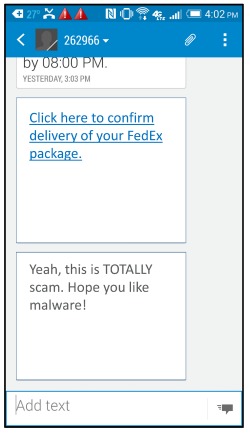 ERIN VAN HANDEL
ERIN VAN HANDEL
HNI Marketing Coordinator
This holiday season, as you're playing Santa from your laptop or smartphone, be aware of the "shipping problem" scam.
You may get a message that says your UPS, FedEx, or U.S. Postal Service package from Amazon.com or another retailer has been delayed or needs some personal info to get through.
Our professional advice: Don't share that intel! It's one of the 2014 holiday Internet scams.
The lines between personal and work computer/phone are blurred these days. This means more people than ever — your family, your employees, and your co-workers — need to hear this cyber safety message.
Be on Lookout for "Shipping Problem" Email
Here's what you have to keep your eyes peeled for: You get an email from UPS, FedEx, or USPS. The message says they tried to deliver a package but an incomplete address held up the delivery.
There's a link in the email that reads, "Please click on the link to correct the address and you will get your package."
If you click on the link, you could be exposing your computer to malware. This could be especially bad news if you're checking email on your work computer. Your employer's entire IT system could face infection over one harmless-looking link.
"Confirm Delivery" Texts Also Suspect
In a similar vein, watch out for texts from UPS, FedEx, and USPS that "confirm delivery" and then ask for personal information. A reputable firm never will ask you to share sensitive information via text.
And if you see an email or text regarding a "wrong transaction" that asks you to "click the link for your refund," don't do it! Again, you could be exposing your phone or computer to malware.
Make Yourself Scam-Proof
In 2014 holiday Internet scams, the bad guys are getting more sophisticated with their schemes to steal your data. Here are a few ways to protect yourself:
1.) Share the risks of malware infection with employees, co-workers, and your family (especially teenagers). Malicious software could seize up all the files on your computer and potentially release confidential client information.
2.) Trust your gut, and don't click it! As was mentioned earlier, reputable businesses don't ask for sensitive personal information over channels that aren't secure. They also don't demand that you act ASAP. If the request seems too informal, it's probably not legit. You have all the peace of mind in the world to gain by reaching out through formal customer service channels with questions about a "request."
3.) Make sure your IT security software is up to date. Common sense (see tip No. 2) should help you block most scam attempts. Then get some backup in the form of software to keep your machine running smoothly.
4.) Stay up to date on Internet crime schemes. Visit the Internet Crime Complaint Center to review a list of current scams. You also can file a complaint via the IC3 if you've been the victim of a scam. IC3 is a partnership between the FBI and the National White Collar Crime Center. They mean business.
5.) If it seems too good to be true, it probably is. Yep, this is the oldest piece of advice in the book, but you hear it all the time because it's a fact.
Have you come across any 2014 holiday Internet scams this during seasonal shopping? Please share in comments for the benefit of other readers! Thanks!
Related Posts:
What to Expect in Business Insurance in 2015
Cyber Liability and Recovery: Lessons from Target's Data Breach
How to Tell if Your Cyber Liability Policy is Coming Up Short
.png?width=69&height=53&name=Acrisure%20Logo%20(White%20Horizontal).png)

![[Bucking Driver Turnover with Wellness] An interview with Melton Truck Lines](https://no-cache.hubspot.com/cta/default/38664/45c98cfb-4afd-42fd-b225-957439b090c7.png)
